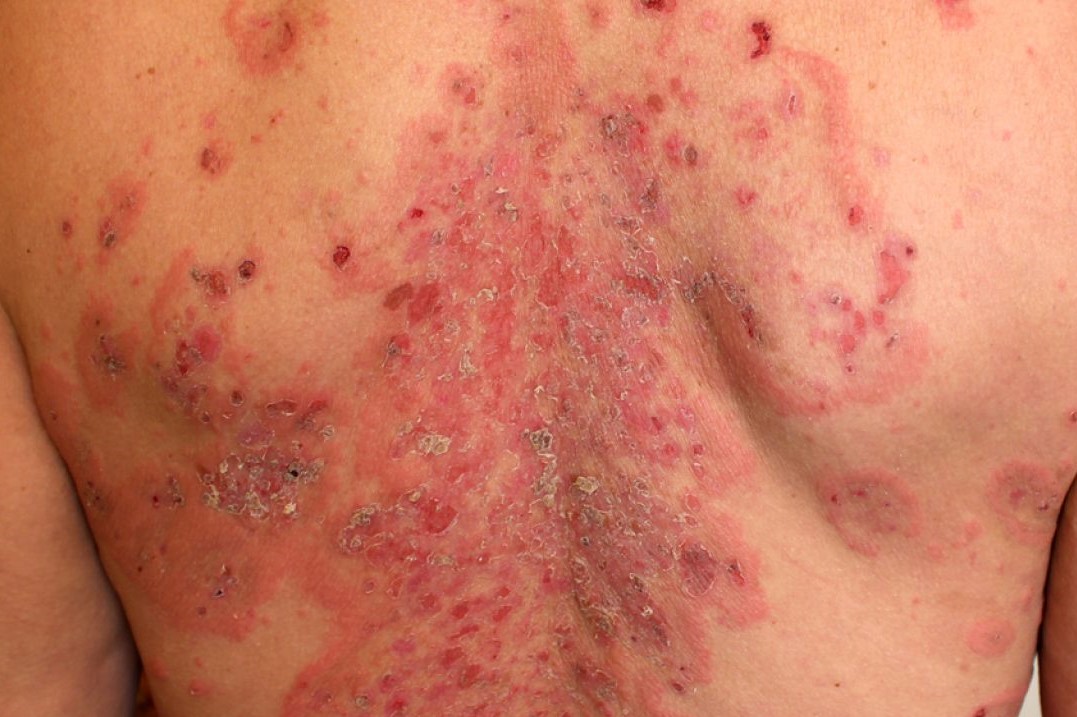
Pemphigus: discovering this rare autoimmune skin disease
Pemphigus is a rare autoimmune disease characterised by the formation of blisters on the skin and mucous membranes (mouth and genital regions)
It generally occurs in adulthood, in both males and females; rarely it can also affect children.
Pemphigus, the cause is still not entirely clear
Triggering factors such as infections, drugs, malignant tumours, etc. are hypothesised.
Whatever the cause, antibodies directed against certain proteins (desmoglein 1 and 3) of the skin and mucous membranes appear.
These proteins have the role of ensuring the adhesion of cells to each other, thus maintaining the integrity of the skin.
Pemphigus often appears initially on the mucous membranes of the mouth and sometimes of the oesophagus, and then spreads to the entire skin of the body
It manifests as diffuse, flaccid (non-tender, similar to burns) blisters with a serous (transparent) content on healthy skin or mucosa.
The blisters are rather fragile, break off and evolve into erosions with a high risk of infection and repercussions on the patient’s general condition due to fluid loss resulting in dehydration.
Symptoms of pemphigus are pain and sometimes difficulty in swallowing and poor food intake (due to inability to feed regularly because of lesions in the oral cavity).
Evolution is chronic-recurrent (with relapses) and may last for months and sometimes years.
The diagnosis of pemphigus is based on the clinic (history and appearance of lesions, occurrence of other symptoms)
Diagnostic confirmation of pemphigus involves a blood sample to search for specific antibodies and a skin biopsy (removal of a tiny fragment of skin) to perform a microscopic examination (histological examination) including immunofluorescence to demonstrate the presence of autoantibodies directed against the skin desmogleins.
There is no decisive therapy that goes to the causes of pemphigus
Therapy is aimed at reducing inflammation (reduction of the extent, duration and frequency of appearance of blisters) and the resulting complications (pain, infection and eating difficulties).
Treatment consists of:
- Local (topical) therapy based on disinfectants and in the case of infection also local or systemic antibiotics (by mouth or intravenously, depending on the extent and extent of the infection) and bandaging. On scabs, it is useful to apply emollient creams to facilitate their removal;
Systemic therapy:
- Systemic corticosteroids (by mouth or intravenously, depending on severity);
- Immunosuppressants such as Methotrexate, Azathioprine, Mycophenolate Mofetil;
- Plasmapheresis, plasma separation technique with the aim of removing autoantibodies from the blood;
- Intravenous immunoglobulins, which, administered in high doses, act as immunosuppressants and reduce the amount of autoantibodies in the blood.
Systemic drugs are not without risks, especially of an infectious nature.
It is therefore necessary to monitor patients closely during treatment, both to assess their efficacy and to evaluate possible side effects or complications related to the drug itself.
The prognosis for children with pemphigus is usually good, unlike adults where the outcome can be fatal
Healing of the skin lesions caused by pemphigus most often results in the appearance of dyschromic scars (coloured differently from healthy skin) that often disappear on their own over time.
Read Also:
Emergency Live Even More…Live: Download The New Free App Of Your Newspaper For IOS And Android
Atopic Dermatitis: Treatment And Cure
Psoriasis, A Disease That Affects The Mind As Well As The Skin
Allergic Contact Dermatitis And Atopic Dermatitis: The Differences
Adverse Drug Reactions: What They Are And How To Manage Adverse Effects
Symptoms And Remedies Of Allergic Rhinitis
Allergic Conjunctivitis: Causes, Symptoms And Prevention
What Is And How To Read The Allergy Patch Test
Eczema Or Cold Dermatitis: Here’s What To Do
Psoriasis, An Ageless Skin Disease
Clinical Manifestations Of Atopic Dermatitis


